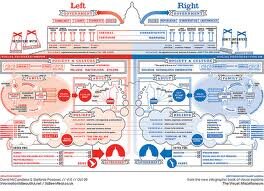 Click for full size version: Left vs. Right: A Visualization of the Political Spectrum
Click for full size version: Left vs. Right: A Visualization of the Political Spectrum
Fair and balanced
Back in January I posted this infographic on my Facebook page as an interesting example of information design. I found it thought-provoking, but didn’t bother to articulate why.Then this morning, I was watching a TED talk on YouTube with information designer David McCandless, and up popped the same chart. (Ironically, I had just come indoors after pulling my collection of political yard signs out of the ground, hoping to appease my neighbors.)Viewing the graphic nearly a year later, in the aftermath of the cut-throat mid-term elections, it struck me as quaint and out of date. The hues of red and blue now looked too subdued, the lines too soft around the edges. It's a friendly looking graphic, in contrast to the technicolor FOX News one in my mind.And I guess that's part of the point -- and perhaps the chief reason it begs a second look. These are polarizing times, and we desperately need to find some commonality.
Oh say, can you see...
As McCandless eloquently described the thought process behind his infographic, I scribbled down his words (on Post-its, the back of an envelope, and the margins of the comics section of the Boston Globe). Here’s the bit that resonated with me most: "When I was designing this image, I desperately wanted this side, the left side, to be betterthan the right side (...being a journalist type, a left-leaning person). But I couldn’t because I would have created a lopsided, biased diagram. So in order to really create a full image I had to honor the perspectives on the right-hand side, and at the same time I had to sort of, uncomfortably, recognize how many of qualities were actually in me—which was really, really annoying... and uncomfortable. "But not too uncomfortable ... because there’s something unthreatening about seeing a political perspective versus being told or forced to listen to one. You’re capable of holding conflicting viewpoints, joyously even, when you can see them."
"When I was designing this image, I desperately wanted this side, the left side, to be betterthan the right side (...being a journalist type, a left-leaning person). But I couldn’t because I would have created a lopsided, biased diagram. So in order to really create a full image I had to honor the perspectives on the right-hand side, and at the same time I had to sort of, uncomfortably, recognize how many of qualities were actually in me—which was really, really annoying... and uncomfortable. "But not too uncomfortable ... because there’s something unthreatening about seeing a political perspective versus being told or forced to listen to one. You’re capable of holding conflicting viewpoints, joyously even, when you can see them."
 A matter of perspective
A matter of perspective
"That’s what’s exciting for me: to see how data can change my perspective and change my ideas, even mid-stream."
-- David McCandless, author of Information is Beautiful, available on Amazon.com and at informationisbeautiful.netWatch the entire TED Talk here:
David McCandless: The beauty of data visualization (Click on link above. The Left vs. Right bit is at 14:50.)

 It wasn’t until after the election when pundits started parsing the role of
It wasn’t until after the election when pundits started parsing the role of 
